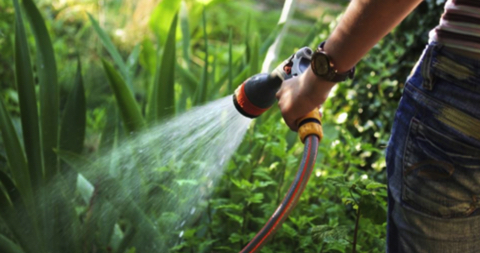
Information

DO I REALLY NEED AN
IRRIGATION SYSTEM?
If your time poor over summer and you love your garden, it's likely you'll answer with YES. If so, some points in the following will be worth a read. The truth is, an automated irrigation system is a luxury item, it's not a necessity.
Whether you decide to go ahead with an installation may depend on your priorities, your soil profile and your available time - especially over the summer months. Proper hand watering can take a long time - time which over the summer months, you might not have?
As a highly experienced irrigation professional, I can tell you that many of the poorly designed and installed systems that I come across during service calls have unfortunately been a complete waste of time and money. They're very common, and often a direct result of landscapers and gardeners taking on a larger scope of works than they are adequately qualified to carry out.
Landscapers today are virtually outdoor builders and their scope of works has grown extensively. This, in my opinion makes them vulnerable to the 'Jack of all trades, master of none' title. It's not just an entry level problem either. I have encountered many high end, high impact landscapes with seriously low standard irrigation systems, which in reality, only becomes a problem during the warmer months, or in areas where the soil profile or condition requires more frequent, even watering.
Due to the complexities of proper irrigation design and installation, many of these below par systems can be very expensive to rectify properly and in some cases it's more cost effective to start again!
However, the cost of a new professional system has now become higher again due to the established nature of the site and the limitations which the site may now pose.
The reasons why these systems have been a waste of money are simple:
There are more reasons, but essentially it comes down to that fact that poor systems will cost you more in the long run. The key is to get it designed and installed properly. 'Get it right from the start, Water Right, Water Smart'. So, when you ask yourself, do you really need a system, consider some of the above.
Also consider that plants need more than just water, they need to be fed! They also can benefit from a helping hand when it comes to pests and disease. A qualified horticulturalist might be worth their weight in gold!
Personally, for myself, an irrigation system is essential as I'm too busy over the summer months to be hand watering. In saying that, my system is only used during those months and because I'm using Hunter's Hydrawise, it won't come on at all unless the temperature exceeds my setting of 25 degrees.
5. What about pumps and tanks? I see many systems that are always running pumps, whether they are using mains water or rain water! Often these systems have tanks that are too small, overflowing all winter and empty all summer. Many of them are underground tanks also that have cost a lot to install.
So the point is, yes, it's highly recommended to catch rain water, but make sure your system is designed properly - making it a sustainable and economically worthwhile excercise. Otherwise you might just be wasting your money!
4. A quality design and installation should easily last a lifetime! Again, the sub-standard system is far more likely to incur ongoing service costs.
3. These sub par systems are generally installed with no documentation. A professional system should be supplied with a scale 'As Constructed' drawing for your records. This documentation is a MUST and is capable of saving you money in the future if alterations or service are required.
2. Inferior products are used because they are cheap but they cost you more in the long run, failing at the worst possible time.
1. Poor design (often NO design!) equals inefficiency as a direct result of uneven water application rates over the garden and/or lawn areas.
People often try to compensate for this by running the systems longer than should be required resulting in too much water for some areas and often still not enough water in other areas.